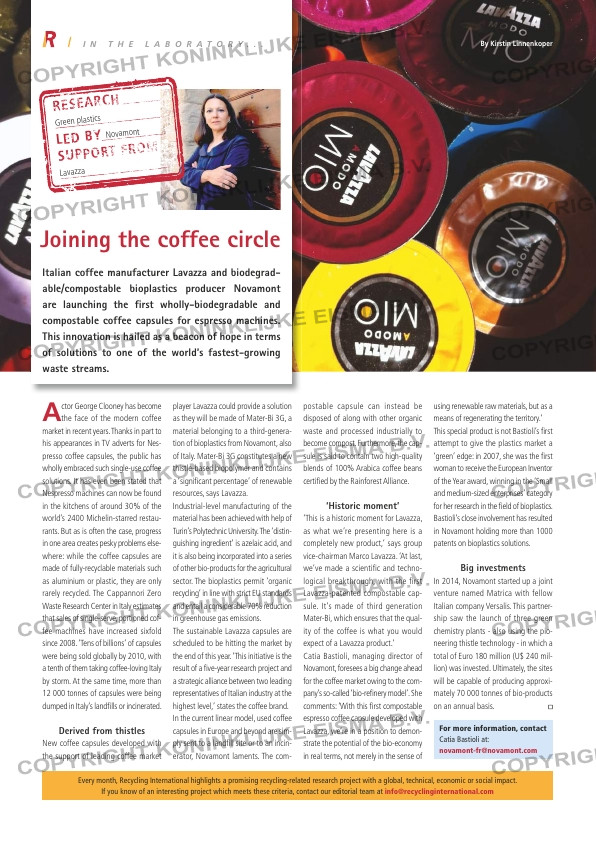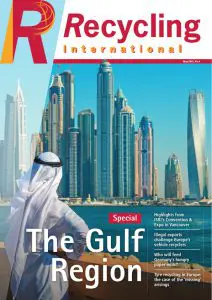Page 73 from: May 2015

For more information, contact
Catia Bastioli at:
[email protected]
I N T H E L A B O R A T O R Y . . .
using renewable raw materials, but as a
means of regenerating the territory.’
This special product is not Bastioli’s fi rst
attempt to give the plastics market a
‘green’ edge: in 2007, she was the fi rst
woman to receive the European Inventor
of the Year award, winning in the ‘Small
and medium-sized enterprises’ category
for her research in the fi eld of bioplastics.
Bastioli’s close involvement has resulted
in Novamont holding more than 1000
patents on bioplastics solutions.
Big investments
In 2014, Novamont started up a joint
venture named Matrica with fellow
Italian company Versalis. This partner-
ship saw the launch of three green
chemistry plants – also using the pio-
neering thistle technology – in which a
total of Euro 180 million (U$ 240 mil-
lion) was invested. Ultimately, the sites
will be capable of producing approxi-
mately 70 000 tonnes of bio-products
on an annual basis.
Actor George Clooney has become the face of the modern coffee
market in recent years. Thanks in part to
his appearances in TV adverts for Nes-
presso coffee capsules, the public has
wholly embraced such single-use coffee
solutions. It has even been stated that
Nespresso machines can now be found
in the kitchens of around 30% of the
world’s 2400 Michelin-starred restau-
rants. But as is often the case, progress
in one area creates pesky problems else-
where: while the coffee capsules are
made of fully-recyclable materials such
as aluminium or plastic, they are only
rarely recycled. The Cappannori Zero
Waste Research Center in Italy estimates
that sales of single-serve, portioned cof-
fee machines have increased sixfold
since 2008. ‘Tens of billions’ of capsules
were being sold globally by 2010, with
a tenth of them taking coffee-loving Italy
by storm. At the same time, more than
12 000 tonnes of capsules were being
dumped in Italy’s landfi lls or incinerated.
Derived from thistles
New coffee capsules developed with
the support of leading coffee market
postable capsule can instead be
disposed of along with other organic
waste and processed industrially to
become compost. Furthermore, the cap-
sule is said to contain two high-quality
blends of 100% Arabica coffee beans
certifi ed by the Rainforest Alliance.
‘Historic moment’
‘This is a historic moment for Lavazza,
as what we’re presenting here is a
completely new product,’ says group
vice-chairman Marco Lavazza. ‘At last,
we’ve made a scientifi c and techno-
logical breakthrough, with the first
Lavazza-patented compostable cap-
sule. It’s made of third generation
Mater-Bi, which ensures that the qual-
ity of the coffee is what you would
expect of a Lavazza product.’
Catia Bastioli, managing director of
Novamont, foresees a big change ahead
for the coffee market owing to the com-
pany’s so-called ‘bio-refi nery model’. She
comments: ‘With this fi rst compostable
espresso coffee capsule developed with
Lavazza, we’re in a position to demon-
strate the potential of the bio-economy
in real terms, not merely in the sense of
player Lavazza could provide a solution
as they will be made of Mater-Bi 3G, a
material belonging to a third-genera-
tion of bioplastics from Novamont, also
of Italy. Mater-Bi 3G constitutes a new
thistle-based biopolymer and contains
a ‘signifi cant percentage’ of renewable
resources, says Lavazza.
Industrial-level manufacturing of the
material has been achieved with help of
Turin’s Polytechnic University. The ‘distin-
guishing ingredient’ is azelaic acid, and
it is also being incorporated into a series
of other bio-products for the agricultural
sector. The bioplastics permit ‘organic
recycling’ in line with strict EU standards
and entail a considerable 70% reduction
in greenhouse gas emissions.
The sustainable Lavazza capsules are
scheduled to be hitting the market by
the end of this year. ‘This initiative is the
result of a fi ve-year research project and
a strategic alliance between two leading
representatives of Italian industry at the
highest level,’ states the coffee brand.
In the current linear model, used coffee
capsules in Europe and beyond are sim-
ply sent to a landfi ll site or to an incin-
erator, Novamont laments. The com-
Italian coffee manufacturer Lavazza and biodegrad-
able/compostable bioplastics producer Novamont
are launching the first wholly-biodegradable and
compostable coffee capsules for espresso machines.
This innovation is hailed as a beacon of hope in terms
of solutions to one of the world’s fastest-growing
waste streams.
By Kirstin Linnenkoper
Every month, Recycling International highlights a promising recycling-related research project with a global, technical, economic or social impact.
If you know of an interesting project which meets these criteria, contact our editorial team at [email protected]
RESEARCH
LED BY
SUPPORT FR
OM
Green plastics
Novamont
Lavazza
Joining the coffee circle
RI 4-In the lab.indd 73 30-04-15 14:31



